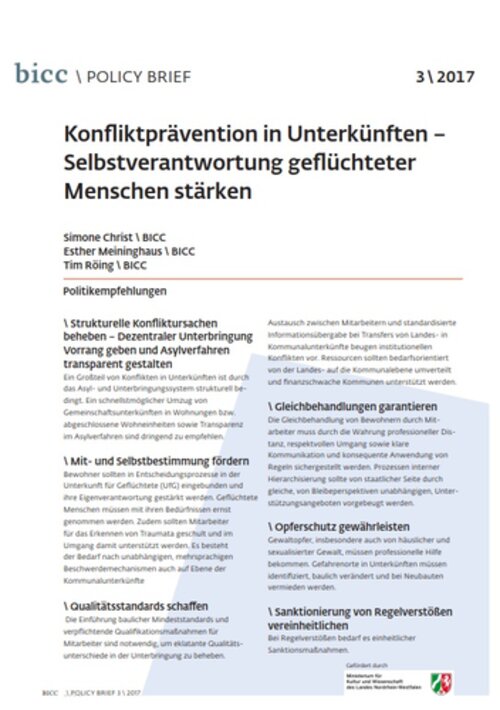Publications
Konfliktprävention in Unterkünften – Selbstverantwortung geflüchteter Menschen stärken
Release Date
2017-06
Language
- German
Topics
- –
This Policy Brief presents recommendations on conflict prevention in German refugee shelters, in which all refugees are obliged to live until their applications for asylum have been processed. This study aims to contribute to prevent, minimise or resolve conflict at the level of shelters run by the state (stage 1) as well as by local municipalities (stage 2).
BICC Policy Brief 3\2017 titled „Conflict Prevention in Refugee Shelters - Strengthening Refugees' Agency" is based on a study conducted over a period of 12 months analysing the genesis of conflicts and their trajectories in North Rhine-Westphalia (NRW), which is one of Germany's 16 federal states. NRW has hosted the highest number of refugees in Germany since 2011. Fieldwork was carried out by the authors Simone Christ, Esther Meininghaus and Tim Röing in 33 shelters with more than 220 participants.
The authors state that conflict mainly arises for structural reasons, i. e. as a consequence of the asylum and shelter systems. As a result, they provide the following recommendations:
\ Addressing structural causes of conflict - prioritise decentralised accommodation and render the asylum process more transparent
Most conflict results from structural causes, i.e. it is due to the asylum and shelter systems. Therefore, transfers from community shelters into apartments or self-contained flats and transparency as regards the asylum application process are urgently recommended.
\ Support the involvement of refugees in decision-making processes and enhance their agency
Residents should be involved in decision-making processes in the shelters and their agency should be strengthened. The needs of refugees must be taken seriously. Staff should be trained in identifying trauma, and they should be supported in taking an appropriate course of action. There is a clear need for a system that allows residents to voice grievances. These mechanisms must be independent from the institution running the shelter to allow for monitoring, and they should be multi-lingual.
\ Set standards
Introducing minimum standards for shelter construction and providing compulsory training for staff are indispensable for countering the staggering differences between shelters at present. Institutional conflicts can be avoided by strengthening dialogue among staff. In addition, the hand-over of key information on residents should be standardised as regards transfers from state-run to municipal shelters. Seeing as municipalities have vastly different revenues, financially disadvantaged municipalities should be supported, and resources should be reallocated from the state level to the municipal level according to need.
\ Guarantee equality
Staff must treat residents equally by maintaining professional distance, respect, transparent communication and a consistent application of rules towards all residents in the same manner. Processes of internal hierarchisation among residents should be prevented through equal support measures, such as state-run language courses, which must be independent of the prospects of asylum being granted.
\ Ensure the protection of victims of violence
Professional help must be available for victims of violence including, albeit not limited to, domestic and sexual violence. Locations within the shelter that put residents at risk must be identified and amended. Earlier mistakes must be avoided when building new shelters.
\ Standardise sanctions
When rules are violated, sanctions must be clearly standardised and applied equally throughout all shelters.
PDF-Download
BICC_PB_Flucht_NRW_2017_06_01.pdf
[German] (237.28 KB)

Cite as
@techreport{ChristMeininghausRoing2017,
author = "Simone Christ and Esther Meininghaus and Tim Röing",
title = "Konfliktprävention in Unterkünften – Selbstverantwortung geflüchteter Menschen stärken",
latexTitle = "Konfliktpr{'a}vention in Unterk{'u}nften – Selbstverantwortung gefl{'u}chteter Menschen st{'a}rken",
publisher = "BICC",
number = "3",
institution = "BICC",
type = "BICC Policy brief",
year = "2017",
address = "Bonn",
}
Document-Type
BICC Policy brief
Publisher
BICC
Place
Bonn
Countries/Region
Germany



